Chinese track darling Wu Yanni’s reinstatement into the 100m hurdles final after a clear false start smacks of external pressure – and undermines China’s efforts to present an impressive show to the world.
Let me start with some important context. I have been very impressed by the ongoing Asian Games in Hangzhou. The organization, as expected, has been flawless. The thousands of volunteers have gone above and beyond to be friendly and helpful. The 80,000-seater Hangzhou Olympic Sports Center Stadium, designed in the shape of a lotus flower, looks fantastic both inside and out. I was in attendance there last night and the atmosphere from the capacity crowd was as good as I’ve experienced at a sporting event in China. It was the perfect evening for what should have been some great performances from Chinese athletes on China’s national day, October 1. And yet, here we are talking something completely different – and totally avoidable.
How the drama unfolded
Let’s review what happened. It’s a little long, but I need to break it down blow-by-blow to show how it all played out.
The final race of the evening was the women’s 100-meter hurdles final. The lights were dimmed as the athletes were introduced. The atmosphere was electric. China had two athletes in the final, training partners Lin Yuwei and Wu Yanni.
Lin had qualified for the final with a personal best time of 12.79, while Wu qualified in 12.80, just outside her best time of 12.76 – but Wu got by far the biggest cheer. That’s because she went viral this summer in China after her silver medal at the World University Games in Chengdu catapulted her to fame with millions of followers online and has since looked to capitalize .
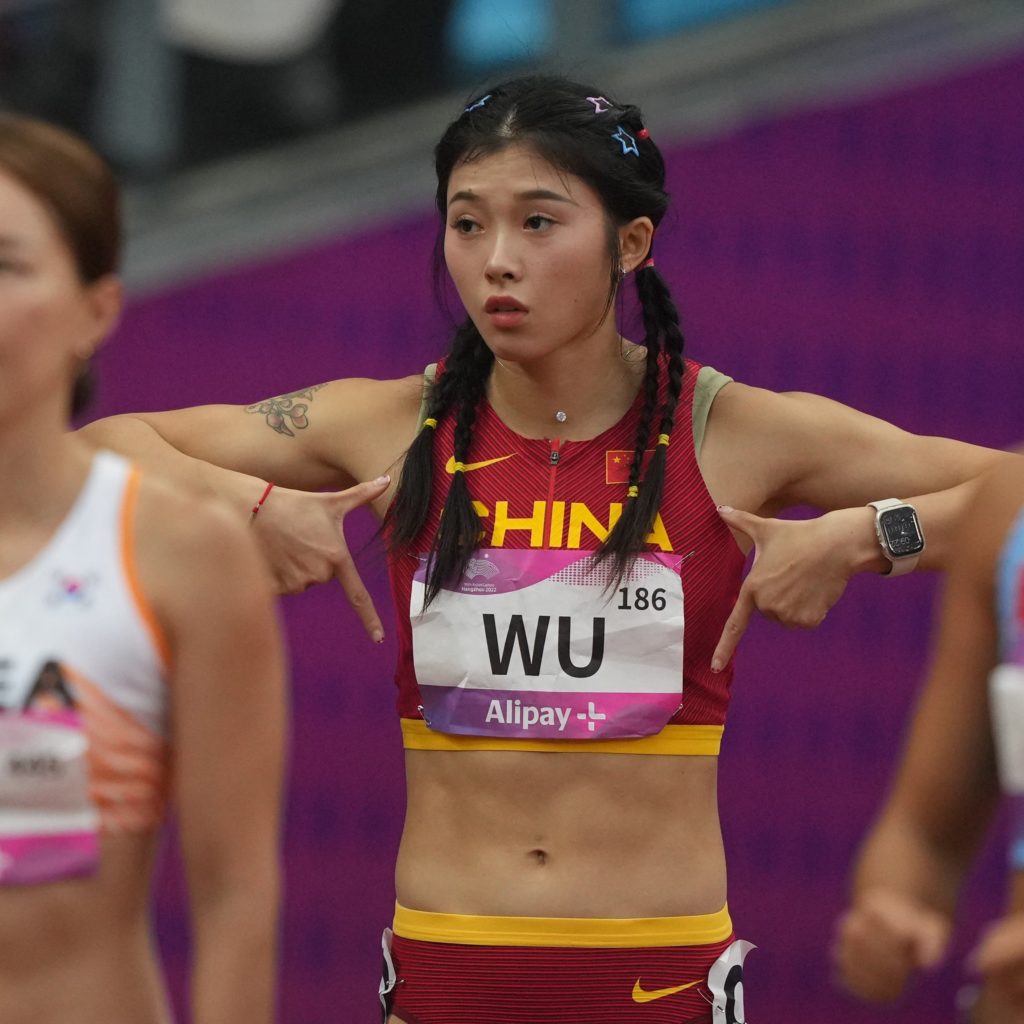
In fact, she’s since been criticized for promoting a slew of brands via livestreaming and not focusing on her training. As they are wont to do – most recently with Su Bingtian – Chinese state media had built her up into one of China’s big stars coming into the Asian Games (see this video clip below).
After the athlete intros, the lights came back on, the athletes got into their blocks and the stadium PA asked the crowd to be quiet.
That’s when the drama started.
Clear false start
There was a clear false start and, as the replay appeared on the stadium’s big screen, there were gasps around the stadium because it was clear for all to see that it was Wu. She was promptly shown a red card, and she walked behind the starting blocks, where she stayed. There was a stunned silence as everyone tried to figure out what was going on. Wu was talking to some officials and I started to wonder at this point why she wasn’t leaving. The false start was clear, it was obviously her and the red card had been shown.
Some additional context here (which I didn’t know at the time). At the recent Asian Championships in Bangkok, Wu was also red carded for a false start, but took over five minutes to leave the track (video here). She attempted to argue her case with officials, appearing to say that the wet track had caused her to slip. But that likely caused further discussion about the right of an athlete to run under protest.
Since 2010, false starts have resulted in immediate ejection. On-track protests such as the famous examples of Linford Christie in the 1996 Olympic 100m final and Jon Drummond at the 2003 World Championships, while dramatic, disrupted race schedules that had been timed to the second for TV broadcasts. Repeated rounds of false starts did the same.
Suffice to say this false start rule is not new.
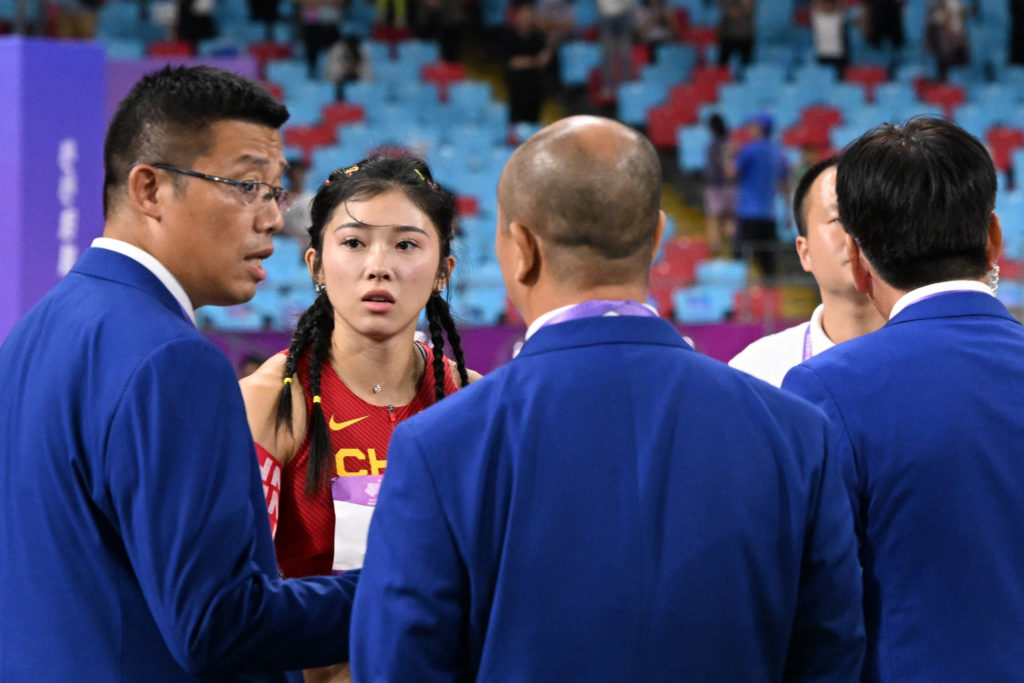
But Wu, as in Bangkok, wasn’t convinced. She continued to talk to the officials, and the replay was shown a couple of more times. Then, several minutes into this, the Indian athlete Jyothi Yarraji – next to Wu in lane 5 – was pulled into the discussion. As we all examined the slow-motion replay, it looked like Wu went first by a long way, and then Yarraji started fractionally ahead of the rest of the field. But Yarraji was clearly triggered by the false start of the athlete next to her (i.e. Wu). The red card for Wu was not a controversial decision. It was just shocking in the moment, because this had happened to the Chinese star on Chinese soil on China’s national day, whom the crowd, viewers on TV, sponsors, and media all desperately wanted to win.
Yarraji was seen throwing her arms up as if to say, ‘What on earth is going on? Why am I now being accused of this?’ But at some point Yarraji, too, was given a red card, which was patently ridiculous on the evidence of the replay. [UPDATE: At the stadium, the red card to Wu was shown on the big screen, but the red card to Yarraji was not. However, on Chinese state broadcaster CCTV, millions watching at home were only shown the second red card to Yarraji, not the one to Wu.]
It was about this point that it first occurred to me that Yarraji was deliberately being made a scapegoat, and that after a little bit more discussion, the officials would say something along the lines of, ‘Well, it was both of you who false started, but we’ll be magnanimous and let you both back in,’ ostensibly in a way to get Wu back into the race. I’m speculating here because it hasn’t been explained, and none of this was cleared up at the press conference, but that’s what ended up happening. After what seemed like six or seven minutes of discussion with the two athletes, the field lined up again for the restart.
Running “under protest”
Athletes are allowed to protest these decision and in limited circumstances can run “under protest”, before the final decision is made after the race. But take a look at the rules:
[8.4] In a Track event, [8.4.1] if an athlete makes an immediate oral protest against having been charged with a false start, a Track Referee may, if they are in any doubt, allow the athlete to compete “under protest” in order to preserve the rights of all concerned. Competing “under protest” shall not be allowed if the false start was indicated by a World Athletics certified start Information system, unless for any reason the Referee determines that the information provided by the system is obviously inaccurate.
Under the rules, there were no grounds for Wu to run under protest. So the race was restarted with two major questions outstanding:
- Why was Wu allowed to run?
- Why was Yarraji shown a red card?
If this had happened at an Olympics, it would have been a massive story. I’m writing this partly out of frustration at how little coverage the story has received (outside of Indian, where the narrative is understandably focused on Yarraji). But there are very few international journalists at these Games and there’s an incredible amount of sport to cover (more events than at the Olympics). Meanwhile, these aren’t the types of stories that would be published in today’s China, meaning we can only speculate on what really happened behind the scenes.
However you look at how this unfolded, it doesn’t look great. It just felt like the local officials needed to find a way to let Wu run and this was their ham-fisted solution. I’m reminded of another hurdler, Liu Xiang, at the 2008 Olympics, when he clearly wasn’t fit to race, but the extent of his injury had been covered up and he came into the stadium anyway – before walking off down the tunnel in front of a stunned crowd.
Back to the race. The field got off cleanly at the restart and from my position near the finish line, I initially thought that Wu had just edged it, but in fact she’d been beaten by her teammate Lin by 0.03 seconds, with Yarraji in third.
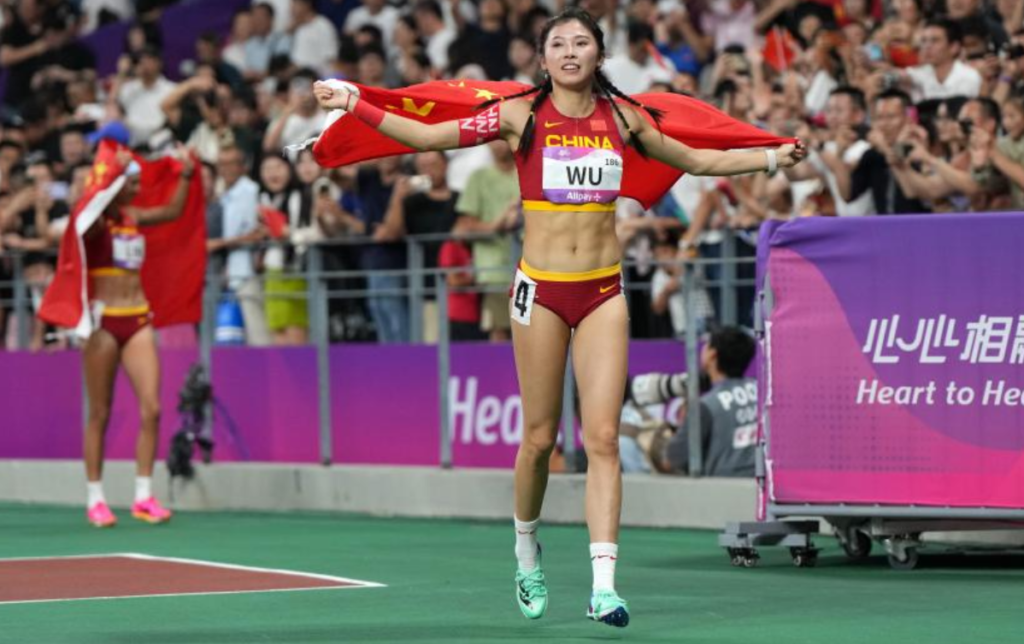
The two Chinese girls draped themselves in Chinese flags, and soaked up all the applause, while I was left open mouthed at what I’d just seen. To add insult to injury, Wu was eventually disqualified about 20 minutes after the race, after everyone had left the stadium. There have been some pretty dodgy decisions in the world of Chinese sport over the 15 years I’ve been here, but this, for me, ranks right up there.
Yarraji did not look happy after the race. Here’s what she said to media afterwards:
“It’s completely messy for me. I broke down. I was completely down and upset to suddenly see a red flag for me. I didn’t do a false start… I mentally prepared for the first start very aggressively, but that suddenly stopped me, so I can’t explain exactly, but something was missing (in the race)… I wanted a good time and didn’t get that and that’s why I am disappointed.”
These quotes were carried by the Asian Games News Service, which is operated by Chinese state media outlet Xinhua (all the news that’s fit to print, so to speak), so you have to think that these were the more sanitized quotes that saw the light of day.
Winners and Losers
Who are the winners and losers from this sorry escapade? Well, I don’t think anyone really comes out of this with a win. Among the losers are the other Chinese gold medalists from the evening that no one’s talking about. Lin (below) should have had a fantastic win in front of her home crowd on Chinese National Day. But, instead, she received her medal after most of the crowd had gone home, while the focus remained on the athletes who finished behind her.
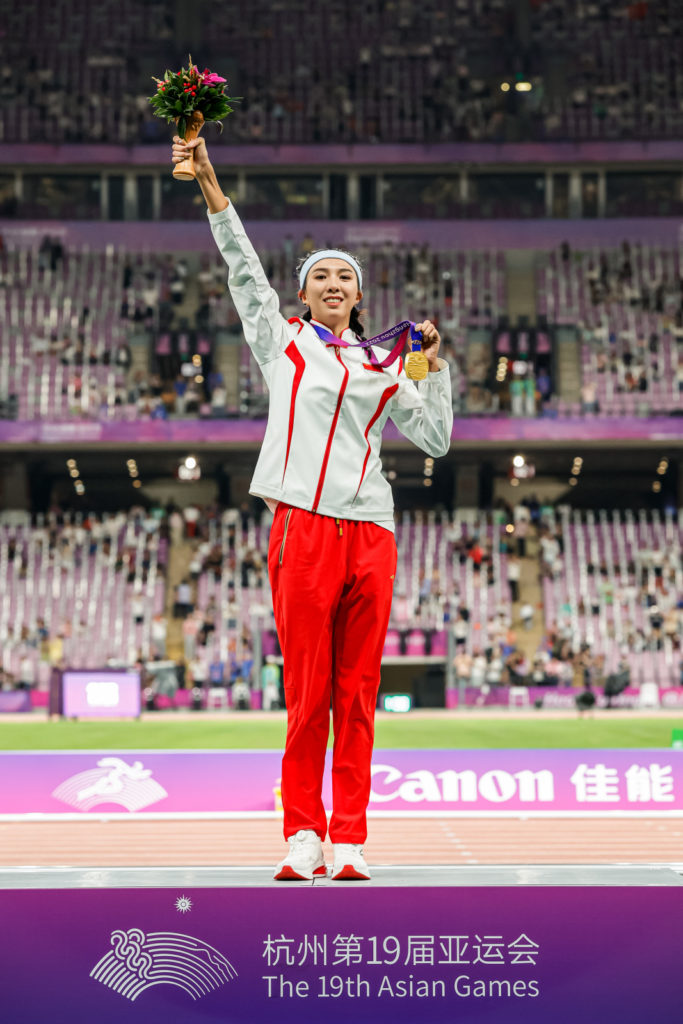
Yarraji is obviously a loser, because she came into the race as one of the favorites and saw her race hugely disrupted through no fault of her own. She wasn’t able to perform at her best, nor was she even able to celebrate her silver until later.
Meanwhile, Wu has today been thrown under the bus a little bit, while Chinese state media have gone into damage control mode. She issued an apology online at 1.40am after the race, but she’s facing a fair amount of backlash online. Some of the criticism is understandable – especially given her experience in Bangkok, she should have accepted the decision and should have left the track. But it’s the job of the race officials to make the final decisions, not Wu.
The main problem I have with this is the fact that this simply cannot happen. This is an international meet on Chinese soil, not a reality show where the producers need to find a way to let the star athlete win – and that’s what it felt like.
I would love to know exactly what happened behind the scenes, but anyone involved in the decisions that were initially made need to realize that this whole fiasco reflects incredibly badly on the organizers. Have three years of COVID closures and a subsequent year of tentative re-opening allowed folks to forget what are considered international norms? Perhaps. China is leading the way in many areas, but this was not a good look at all and, while not hugely important in the overall scheme of things, hasn’t exactly helped to foster better China-India ties (as evidenced by a furious Indian press this morning).
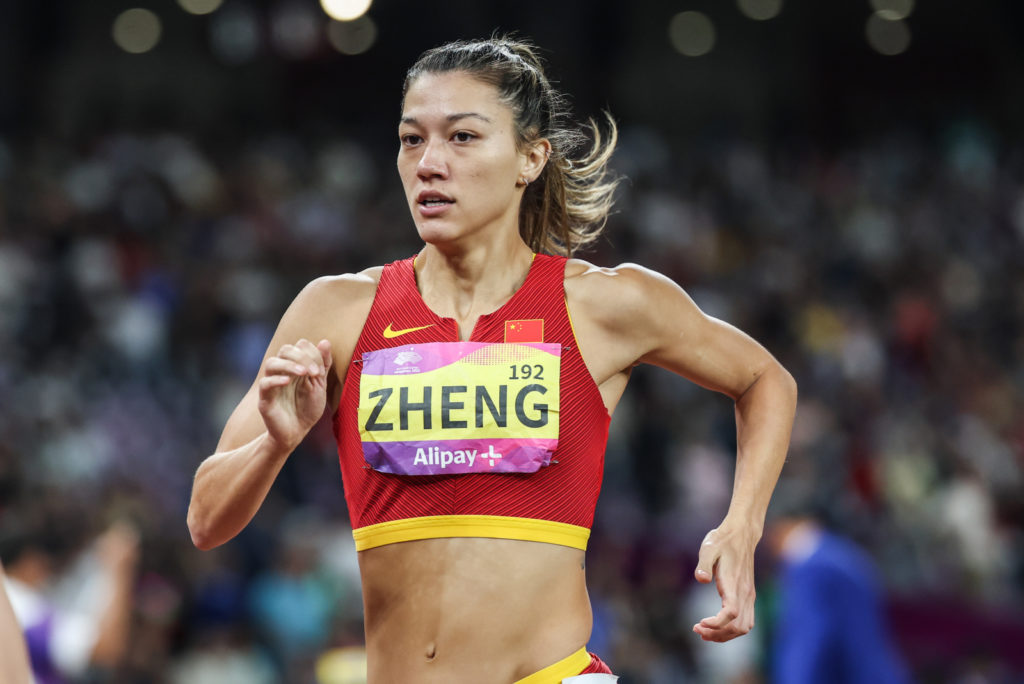
I would love to be talking today about China’s rising stars Lin Yuwei and Wu Yanni in a positive light – if you don’t believe me, take a read through the past ten years of posts on this website! Zheng Ninali (formerly Canada’s Nina Schultz) won the heptathlon for China last night to cap a remarkable story (I covered her ahead of the Tokyo Olympics here), but she barely got a look in.
It’s all just a little bit disappointing, and though the organizers won’t admit as much, the evidence was there for all to see.

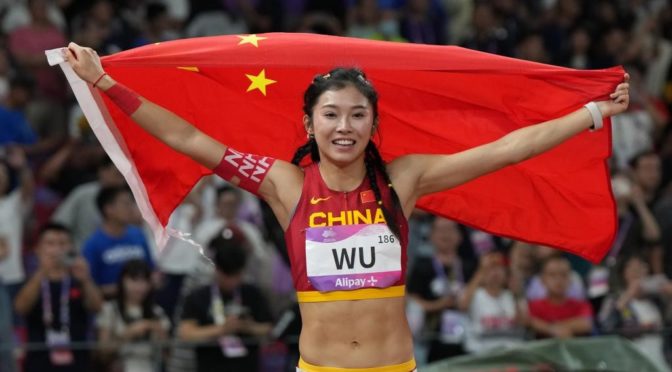

Hi Mark,
i live here in China and was watching on CCTV5+ online…specifically because i wanted to see how Wu would fare with the obvious Wechat hype she’d been getting. Imagine my surprise when the telecasted race on CCTV5+ did not show any of the false start controversy and somehow they managed to completely erase Wu from the race! she was NOT shown in the final. I couldn’t believe it because i didn’t know why she wasn’t in the final and i kept going back and forth between the Games website and the TV broadcast and i counted the number of runners in the replay and it was 7…not 8. Was wondering if you knew anything about this discrepancy or am i going crazy? because if they edited it out it would seem to me to be excessive Chinese loss of face. I don’t know what happened until the next day scrolling wechat.
did not know about this website so will book mark for the future.
Thanks Will, very interesting. Do you have a link to that online? And were you watching the highlights perhaps? I just watched the full race back on CCTV5 (main channel that showed it at the time), which is the first time I’ve seen how it was carried on TV (given I was at the stadium!). Link is below, but it cuts out at 930pm after the race celebrations i.e. before the eventual disqualification was announced, and the programming at 930pm onwards is not currently available: https://tv.cctv.com/live/cctv5/index.shtml?spm=C28340.P2qo7O8Q1Led.S87602.40&stime=1696156200&etime=1696167000&type=lbacks
Mark, i was just watching from this website…the live broadcast for either 5 or 5+, can’t remember who was streaming it. https://sports.cctv.com/?spm=C28340.PdNvWY0LYxCP.EcZU7Ic4uyXC.7
it was supposed to be live but it looked like there was a delay as i followed the results on the Games website and it looked like some results were posted minutes before an actual event was broadcast. it did seem to take an inordinately long time to show the hurdles and they did not show the intro when the runners come out or when they lined up in the blocks. or heck, perhaps i missed it bouncing from one web page to another. but i would swear when they showed the actual race Wu was not even in it and I was looking for her specifically. and Wu and Lin were quite close to each other so impossible to miss. very strange.